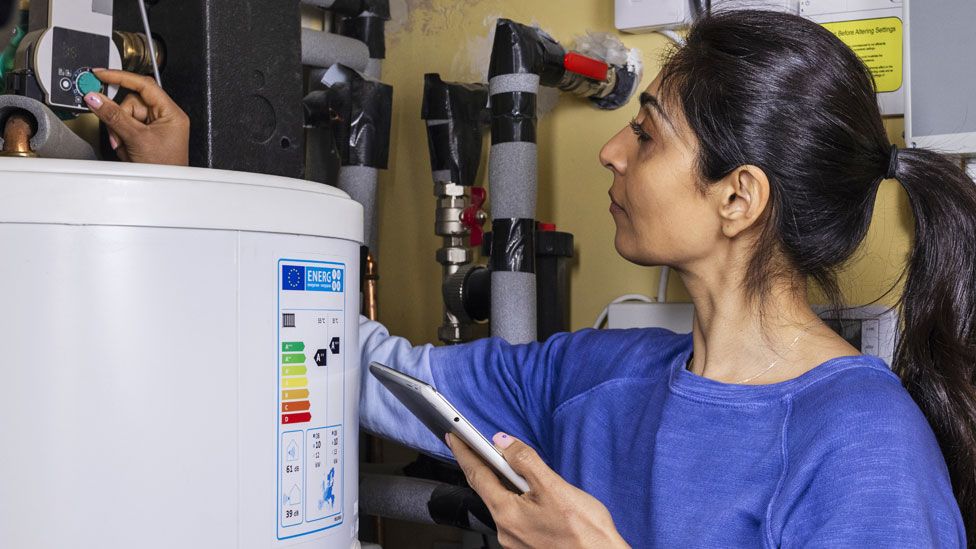 Image source, Getty Images
Image source, Getty Images
By Kevin Peachey
Cost of living correspondent
Household energy prices will rise in January putting more financial pressure on billpayers at the coldest time of year.
Energy regulator Ofgem said the typical annual household bill would go up from £1,834 to £1,928, a rise of £94 or 5%.
It said the rise in bills would be "worrying" at a difficult time for many people, but was the result of higher wholesale costs faced by suppliers.
Analysts have predicted a subsequent drop in prices in March.
The announcement comes the day after Chancellor Jeremy Hunt delivered his Autumn Statement.
The regulator's price cap affects 29 million households in England, Wales and Scotland. Rules are different in Northern Ireland. Ofgem sets the maximum amount that suppliers can charge for each unit of gas and electricity but not the total bill. If you use more, you will pay more.
"It is important that customers are supported and we have made clear to suppliers that we expect them to identify and offer help to those who are struggling with bills," said Jonathan Brearley, chief executive of Ofgem.
Dr Craig Lowrey, principal consultant at energy analysts Cornwall Insight, said: "Amid the cost-of-living crisis, the last thing households need is a rise in energy bills - especially going into the winter months.
"However, as is often the case in the energy market, new challenges have arisen, and our reliance on foreign energy has once again left the UK vulnerable to price increases caused by events around the globe."
A typical household energy bill fell by £240 a year in October to £1,834 a year but, of that, £89 was not an actual drop in the price you pay, but actually the result of a new estimate of the typical amount of gas and electricity used by households. Had the calculation not been amended, the fall would have been £151 a year.
Typical annual household consumption is now estimated to be 2,700 kWh a year for electricity, and 11,500 kWh a year for gas.
Last winter, bill rises would have been higher had it not been for the government's Energy Price Guarantee limiting the typical bill to £2,500. Each household also received £400 of support over six months, but this year the government has not announced any equivalent scheme.
That withdrawal of support and a rise in prices mean bills during the winter alone could be higher than they were last winter for millions of households.
For customers like Roy Bridgewood, that could add extra pressure on to the financial difficulties he is already struggling to cope with.
Roy Bridgewood says paying the bills has been tough
Mr Bridgewood, from Manchester, is about £1,400 in debt on his gas and electricity bills.
"The last payment I made on the gas was about £800. It was every penny I had left in my savings," he said.
He has been out of work for a year and has two teenage children at home.
"I'm struggling to get work, struggling to pay bills and struggling to live. You feel vulnerable," he said.
Experts say he is sensibly trying to pay what he can, and is being open with his supplier.
The vast majority of people pay by direct debit, with payments smoothed out over the year.
Households on prepayment meters will be most affected by higher prices during the winter, as customers tend to pay to top up just before they use the gas and electricity. Their typical annual bill will rise to £1,960 in January.
Those who pay every three months by cash and cheque pay more than those who use other methods of payment. Their typical annual bill in January will be £2,058, some £130 more a year than if they paid by direct debit.

 Movie
Movie 5 months ago
135
5 months ago
135 






![Presidents Day Weekend Car Sales [2021 Edition] Presidents Day Weekend Car Sales [2021 Edition]](https://www.findthebestcarprice.com/wp-content/uploads/Presidents-Day-Weekend-car-sales.jpg)



 English (United States)
English (United States)